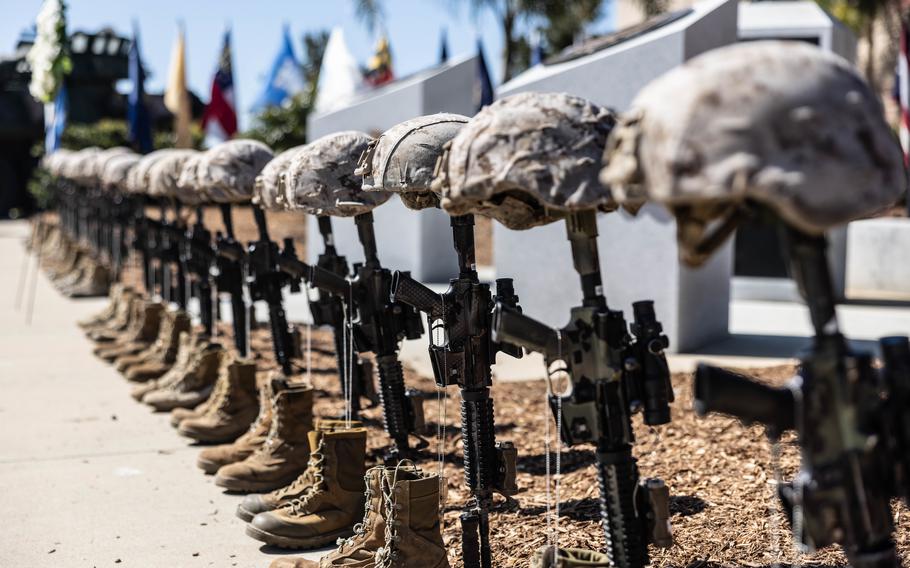
Battlefield crosses representing U.S. Marines from 1st Light Armored Reconnaissance Battalion, 1st Marine Division, who gave their lives during Operation Iraqi Freedom stand in front of a memorial during a 20th anniversary commemoration ceremony the battalion held at Marine Corps Base Camp Pendleton, Calif., March 18, 2023. (Cameron Hermanet/U.S. Marine Corps)
I do not remember the invasion of Iraq. I don’t remember the fall of Baghdad, the declaration of “Mission Accomplished,” or the capture of Saddam Hussein. I turned 3 years old two weeks before the 2003 invasion; developments in international relations were beyond me. I, like millions of other Americans, have only memories from after America entered into a global war on terror and the Second Gulf War.
The evolution of these forever wars brought feelings of instability and grief to my community, feelings that cannot abate until we address their legacy.
I grew up a mile outside of Joint Base Lewis-McChord, an Army/Air Force base in Washington state. Despite the barbed wire fence separating my town from the base, the local community and military were closely intertwined. Many of my neighbors were active or retired military and roughly half of my friends had at least one parent who was serving. Inevitably what their parents’ service meant to them, and what it meant for our community, would be something we talked about as we grew up in the shadow of America’s forever wars.
What did my friends take away from their family’s time in the military? Many view their experience through the lens of civic pride and personal sacrifice, two things essential to the mission of the military. They also took away lessons that the military would prefer they hadn’t. The military meant instability. When a parent or sibling could be ordered abroad at the drop of a hat, to a place you’ve vaguely heard of and could never find on a map, “precarious” hardly covers the feelings a child is left with. Why did their parent have to go? How long would they be gone? Would they be OK when they came home?
One of my first concrete memories of the Iraq War was reading about its supposed end. In the fifth grade we were given a subscription to Time magazine to be read for 20 minutes in class each week. The only article I remember reading was on President Barack Obama’s announcement of the end of the Iraq War. It was a strange thing to read, that the war would end. Would we still send care packages with Pop-Tarts and other snacks to the troops? I was confused.
Even now I’m sometimes confused, because despite the supposed end of this and many other military operations, the legal architecture of the war remains in place. What’s more, its scope has been increasingly twisted, keeping it available for use by enterprising presidents, despite the war’s end.
The law that authorized the Iraq War, the 2002 Authorization for Use of Military Force Against Iraq, has never been repealed by Congress. It, like other pieces of legislation passed in the wake of 9/11, has been used to justify military operations well outside its original parameters. Originally passed to defend the United States against Saddam Hussein’s regime, it has been used to justify operations against Islamic State and even the targeted killing of an Iranian general, bringing us to the brink of another deadly war in the Middle East.
If the executive branch believes it needs the power to carry out sustained military operations, then that needs to be debated and voted on by Congress. If the executive branch is allowed to simply reinterpret decades-old war authorizations to justify entirely unrelated new actions, it will sideline Congress and corrode critical constitutional guardrails against abuse.
Is it fair to tell our troops to fight in a war that our Congress has not authorized? Does that seem like a foreign policy informed by a democratic mandate? It does not.
There is a solution to this status quo of constitutional malpractice. And it begins with repealing the 2002 Iraq AUMF. In late March, by a large, bipartisan margin, the Senate did just that. It was the first time since the Vietnam War they voted to end a war.
President Joe Biden has signaled his support. With the success of the Senate vote, it's imperative the House follows suit. House Speaker Kevin McCarthy has signaled he is inclined to do so. The House has voted to repeal the 2002 AUMF several times before. The votes are there to end one of America’s forever wars.
Repealing the 2002 Iraq AUMF would bring an official end to a conflict my generation grew up alongside. And perhaps, more importantly, it will end the decade and counting of mission creep that allows more conflict in the area to spread unchecked and unfettered. If Congress gets this done, it will send a message that military operations should be based on transparent debate, not a president’s whim. It will begin the important process of untangling the confusing mess of America’s forever wars and prove to a generation that there is a world beyond never-ending conflict.
Kevin Snow is the Militarism and Human Rights Program Assistant at the Friends Committee on National Legislation. Before joining FCNL, he completed a Fulbright research grant in Tallinn, Estonia.